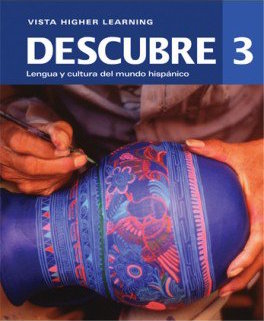
All Solutions
Page 16: Practica
The verbs are:
* **caber**: to fit
* **dar**: to give
* **estar**: to be (temporary)
* **hacer**: to do/make
* **ir**: to go
* **oír**: to hear
* **ser**: be (permanent)
* **tener**: to have
*My apartment ____ on the fifth floor.*
The subject is a singular third person in the present tense, so the correct verb is **está** (*is*).
*The building doesn’t ____ an elevator, and, to reach the apartment, you ____ to go up the stairs.*
The first subject is a singular third person in the present tense, so the correct verb is **tiene** (*has*); the second subject is an implicit singular first person in the present tense, so the correct verb is **tengo** (*have to*)
*The apartment is so small that my things don’t ____.*
The subject is a plural third person in the present tense, so the correct verb is **caben** (*fit*).
*The walls ____ very thin.*
The subject is a plural third person in the present tense, so the correct verb is **son** (*are*).
*At all times, I ____ some neighbor’s radio or TV.*
The subject is a singular first person in the present tense, so the correct verb is **oigo** (*hear*).
*The apartment only ____ a small window, and that’s why it ____ always dark.*
The subject is a singular third person in the present tense in both parts of the sentence, so the correct verbs are **tiene** (*has*) and **está** (*is*).
*I ____ look for another apartment!*
The subject is a singular first person in the present tense, talking about future time, so the correct verb is **voy** (*am going to*).
* The subjects are:
**los malos amigos**: bad friends
**nosotros/as**: we
**tú**: you
**un/a buen/a amigo/a**: a good friend
**yo**: I
* The verbs are:
**apreciar**: appreciate
**compartir**: share
**creer**: believe
**defender**: defend
**discutir**: argue
**exigir**: demand
**hacer**: do/make
**pedir**: ask for
**prestar**: borrow
**recordar**: remember
1. *Un buen amigo aprecia lo que tienes para decir.*
A good friend appreciates what you have to say.
2. *Nosotros creemos que somos buenos amigos.*
We believe that we are good friends.
3. *Los malos amigos siempre buscan razones para discutir.*
Bad friends are always looking for reasons to argue.
4. *Tú defiendes a tus amigos.*
You defend your friends.
5. *Yo recuerdo lo que les gusta y no les gusta a mis amigos.*
I remember what my friends like and dislike.
* Luis: arrive early at the office / sleep until 9:00
-Does Luis arrive early at the office?
-Are you kidding? Luis sleeps until 9:00.
You could say:
* *¿Ana juega al tenis con Daniel?*
Does Ana play tennis with Daniel?
* *No, Ana prefiere pasar la tarde charlando con Sergio.*
No, Ana prefers to spend the afternoon talking to Sergio.
You could say:
* *¿Felipe sale a bailar todas las noches?*
Does Felipe go out dancing every night?
* *No, Felipe tiene clase de química a las 8:00 de la mañana.*
No, Felipe has Chemistry class at 8:00 in the morning.
You could say:
* *¿Jorge y Begoña van a la playa?*
Are Jorge and Begoña going to the beach?
* *No, Jorge y Begoña quieren viajar a Arizona.*
No, Jorge and Begoña want to travel to Arizona.
You could say:
* *¿Dolores y Tony comen muchas hamburguesas?*
Do Dolores and Tony eat a lot of burgers?
* *No, Dolores y Tony son vegetarianos.*
No, Dolores and Tony are vegetarian.
You could say:
* *¿Fermín piensa viajar a México con su amigo Mario?*
Is Fermín thinking about traveling to México with his friend Mario?
* *No, Fermín no lo pasa bien con él.*
No, Fermín doesn’t have a good time with him.

